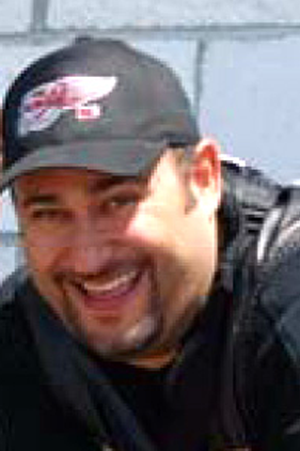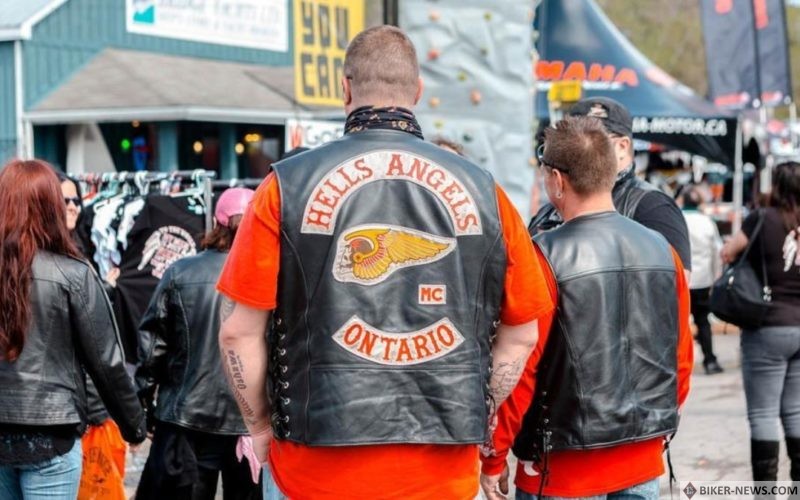BRAMPTON, ONT. — Robert Barletta, dubbed the “Teflon Biker” because charges against the prominent member of the Hells Angels Motorcycle Club didn’t stick, was arrested and removed from an airplane at Pearson airport.
The high-visibility arrest that raised eyebrows from fellow travelers appears to be part of a large police action targeting the Hells Angels in southern Ontario that has not yet been announced.
Barletta was arrested Friday and charged with six criminal offences, five of them gun-related, according to court records.
Other members or associates of the club were also arrested and had a first appearance in Brampton court, Friday. Several friends of those arrested came to court to support them.

Police security at the courthouse was alerted to the incoming cases affiliated with the world’s largest outlaw biker organization.
“We are aware that some Hells Angels members were arrested and appeared at Brampton court,” said Const. Akhil Mooken of Peel Regional Police. Police assigned to provide court security did not turn anyone away from entering the court, he said.
This likely means their supporters removed or did not have or wear “colours” — the patches worn on the backs of outlaw biker clubs or gangs to signify membership. According to Ontario court practice, anyone wearing “colours” are not allowed inside a courthouse.
he names of other accused were not available prior to deadline.
It is understood more than a dozen members and associates were arrested in the police probe and the case involves London, Toronto and Niagara; a public announcement is expected Thursday by the province’s joint forces Biker Enforcement Unit (BEU) after charges, arrests and any seizures or search warrants are tallied and assessed by police.
Messages left for the BEU and the Ontario Provincial Police were not returned prior to deadline.
Barletta faces charges of: unauthorized possession of a firearm; unauthorized possession of a firearm with ammunition; possession of a firearm with ammunition; possession of a weapon obtained by crime; tampering with the serial number of a firearm; and possession of property obtained by crime, according to records filed in court.
Barletta could not be reached for comment.
A lawyer who has defended him on previous charges declined to comment, Monday.
“I will not be making any comments to the press about Mr. Barletta,” Richard Posner said.
Barletta was dubbed the “Teflon biker” in London, because of his reputation for successfully avoiding charges, including for an alleged role in a $103-million illegal sports betting ring.
He became a full-patch member of the Hells Angels in Toronto in 2002 and then became a founding member of the London chapter in 2003. According to evidence filed at a provincial tribunal, Barletta served as president of the London chapter at least until 2008 and remained a member afterwards.
Barletta was charged in a sweeping police probe against Platinum Sports Book, a sophisticated gambling operation in Ontario that had computer servers in Costa Rica.
The investigation of Platinum was revealed in spectacular fashion when officers raided a lavish Super Bowl party north of Toronto in 2013 — it was a catered event thrown as a Platinum customer appreciation night with an open bar for 2,700 guests who vied for expensive door prizes, including a motorcycle and Sea-Doo. Court heard a financial audit, based on intermittent betting records, found Platinum grossed more than $103 million between 2009 and 2013.
Three years after his arrest in the Platinum case, charges against Barletta were withdrawn.
Barletta is also known in legal circles for his landmark legal struggle with the province’s Alcohol and Gaming Commission.
Since before he was known to be part of the Hells Angels, Barletta ran a well-known strip club in London called Famous Flesh Gordon’s.
After an Ontario court ruled the Hells Angels was a criminal organization, the province moved to strip Barletta of his liquor license, sparking a grand legal dispute over whether a member of the Hells Angels can be prevented from having a liquor license despite having no criminal record and no evidence of liquor infractions.
Appeals were won and lost as it was appealed up to the Supreme Court.
An Ontario court ruling declared Barletta was “a committed member of a notorious criminal organization whose stature within that organization requires him to have a good criminal network, to put the interests of the Hells Angels above all else, and to refrain from co-operating with authorities or sharing information that could harm the club.”
His case set a precedent for the standard of applying allegations of criminality to license disputes.
To this day, Barletta’s liquor case is the go-to citation for those fighting for licensing in the face of criminal allegations. People complaining of the province withholding not only liquor licenses but real estate, car dealer, travel agency, mechanics or other business licenses all reach for his case to argue that they are being treated unfairly.
Source: Nationalpost
